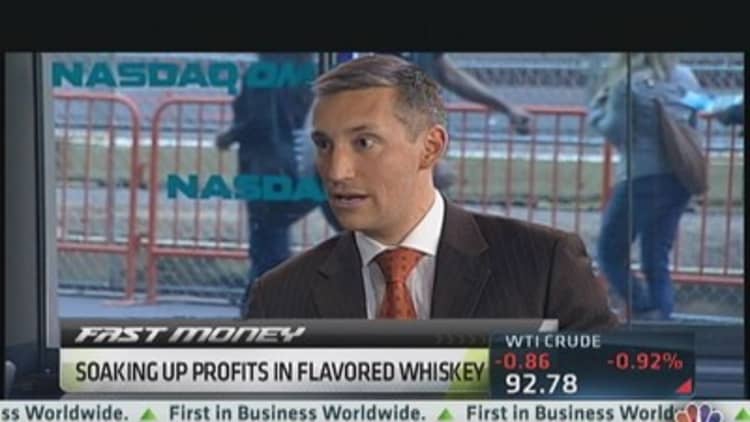Stocks have done great, so maybe they're too pricey for a new investment. Bonds look awfully risky. The easy money has been made in investment properties. And gold? Well, that's for a certain sort with an apocalyptic outlook.
What's left?
Here's a thought: wine and whisky. Values of some labels have skyrocketed in recent years, and a growing supply of well-heeled collectors from Asia and elsewhere could drive prices even higher. Expensive wines and whiskys could truly diversify a portfolio.
Wine investor and collector Kenneth Waltzer, founder and president of California wealth-management firm Kenfield Capital Strategies, says he started drinking quality wines as a young man. He fondly recalls sipping a "fabulous" Bordeaux from the 1920s at the time.
(Read more: Score big cash for fine wine)
Waltzer started serious collecting in the early 1980s and sold a chunk of his holdings in the late '90s for enough cash to start a business. The value of his collection had almost tripled in 10 years, he said. One case of 1986 Bordeaux, bought for $700 in 1988, soared to $4,500 in the decade Waltzer owned it.
Some whiskys also have produced big returns in recent years, making that spirit a growing niche investment, although still tiny compared to wine.
Financial experts urge investors to be careful, however. This world is filled with risks not encountered in other investment arenas. These include the chance some expert will slam your vintage, causing demand to evaporate, or that your fine wine will turn out to be counterfeit—or turn to vinegar.
(Read more: Using alternative strategies for "average" investors)
"It's all about provenance—where it has been and who has stored it, and can you prove it," Waltzer said.
So he and other experts caution against leaping in with both feet. In other words, don't dump your bonds for bottles.
"There's an old joke," said wine investor Stephen F. Lovell, who is a certified financial advisor and branch manager for LPL Financial. "How do you make a small fortune in wine? You start with a large fortune."
It's apparently difficult to find professional help when it comes to wine and/or whisky investing.
(Read more: Gallons of whisky dumped down drain)
Wine advisors are geared to serve connoisseurs who want bottles that get more delicious—but not necessarily more valuable—with time. There are wine appraisers, of course—most of them working for art-appraisal houses—but it would be too expensive to hire one to advise on every small purchase.
In addition, the wine-and-spirits investment market just isn't big enough to support financial advisors specializing in it. And the ordinary financial advisor is lost in this world, although it would be smart to ask yours how much you can afford to bet on something this iffy.
Still, there are plenty of stories of people making money by collecting wines. And although whisky collecting is new and a much smaller field—it's always best to get in on the ground floor if you can stomach a wild ride, right?
So how would an investor get started?
"A lot of people probably start like I did, where it's something that's part of your life," Lovell said. "That doesn't make you a good investor, but that can get you thinking about it."
Then, said Waltzer, start building your knowledge.
It's really a modified farm product. These products are subject to bacteria, mold, fungus [and] pests.Stephen F. LovellCFA and branch manager, LPL Financial
"I would not do it without learning a lot myself," he said. "You'll get your head handed to you if you don't know what you are doing." It's unusual for someone who's not already a wine collector to become an investor, Waltzer said.
Because prices have soared in recent years, it's hard to find bargains, he added.
So, read up on wine and whisky, take courses on wine tasting and start buying in volumes small enough that investment results won't matter.
With wines, it's best to focus on Burgundies and Bordeaux, the famous reds from France. Red wine is more likely to get better with age than white, but these days even most reds are designed to peak quickly, because winemakers don't want the cost of storing them to wait for top dollar, Lovell explained.
Whisky is different because the grains that go into it are less variable in characteristics than the grapes that make wine. One year's whisky is much like any other year, Lovell said.
Unlike red wine, which improves in the bottle, whisky does its aging in the cask, and is stable and stops getting better after being bottled. With less variability than with wine, whisky prices are more stable, making it harder to buy low and sell high, he added.
(Read more: Bad weather batters grape harvest)
Whisky collectors, Waltzer said, should focus on "single-barrel" whiskys, where the supply is limited to just the bottles from one cask—a supply that will diminish over time. Blended spirits are out, because the whole idea of blending is to produce batches that are consistent year after year. Collectors want something unique.
So far, so good—but be aware of the special problems of wine and whisky collecting. Wines, especially, must be stored properly, with a strong floor and controlled heat, light and humidity.
"It's really a modified farm product," Lovell said. "These products are subject to bacteria, mold, fungus [and] pests."
Storage, therefore, can be expensive, and a valuable collection also needs insurance. The longer you hold your investment, the more these costs will chew into any returns, or deepen any losses. And you cannot hold wine forever—to wait out downturns as you do with stocks—because fine wines eventually peak and then decline, Lovell said.
Transaction costs cut into gains, too.
"In most cases, you are buying at retail prices, so already you're at a disadvantage," said Waltzer, noting you'd be competing with bigger players able to buy wholesale. In addition, he said, valuable wines are typically sold at auction, with the seller paying a 15 percent commission. Sales tax may also apply.
(Read more: $200,000 bottle of wine for sale)
"So you're definitely going to have trouble making money," he cautioned.
In the investing sense, these are not liquid holdings: You can't sell at a moment's notice, as you can with a stock. In fact, the big wine auctions mostly take place in London, although it's possible to bid online.
Wines and spirit holdings are also opaque. You don't have the wealth of information you do with a publicly traded stock or bond.
"We have plentiful information about stocks, and that information is free," said Lovell, adding that it can be expensive to get information about a scarce wine.

Finally, values are volatile. Connoisseurship is fickle and faddish, and a vintage that is adored by some experts may be despised by others. You just don't know whose views will prevail. Lovell said he recently attended a wine tasting and thought one of the offerings was just awful, but the presiding expert loved it.
(Read more: Low-alcohol wines set to boom?)
The bottom line, according to experts, is for investors to dip their toe into wine and spirits investing only if they love wine or whisky. Investors should prepare to spend a lot of time and treasure learning, and don't count on market-beating gains, experts say.
And buy only what you love, because, in the end, the big return may come not from selling what you've bought, but from drinking it.
—By Jeff Brown Special to CNBC.com




